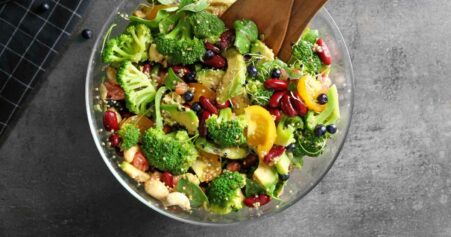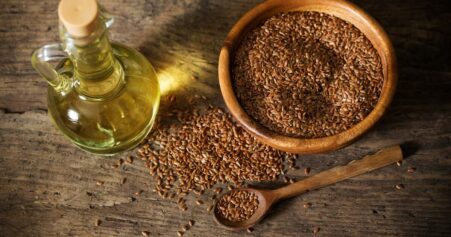Table of Contents
What are good selenium sources on a vegan diet?
The trace element selenium makes up only a small portion of the body’s total mineral content, but it performs essential functions in metabolic processes. The selenium content of vegan sources depends on soil conditions. Therefore, there are regional differences. In the USA, there are selenium-rich soils, while Europe tends to be deficient in this mineral. This is reflected in the selenium intake of the US and European populations (Ervin et al., 2001; Combs, 2004). In the European region, most of the dietary selenium comes from sources of animal origin. This is why people on vegan diets are considered a risk group. However, by consuming vegan selenium sources, even vegans can meet their selenium needs and avoid deficiencies.
Functions
The trace element plays a vital role in some metabolic processes as a component of various enzymes, such as in antioxidant reactions that are important for cells protection (Leitzmann et al., 2009). Additionally, selenium is involved in thyroid activity, working with the trace element iodine, which is a component of our thyroid hormones. As a cofactor of enzymes that activate thyroid hormones, selenium enables them to work.
reactions that are important for cells protection (Leitzmann et al., 2009). Additionally, selenium is involved in thyroid activity, working with the trace element iodine, which is a component of our thyroid hormones. As a cofactor of enzymes that activate thyroid hormones, selenium enables them to work.
It also plays a role in the synthesis of genetic material, cell division and growth, strengthens the immune system and participates in detoxification processes. In men, selenium is also responsible for sperm formation and sperm quality, so the mineral supports or enables healthy fertility.
Bioavailability
In food, selenium is found mainly in organic form, bound to specific amino acids, which are the building blocks of proteins. Chemically, the trace element is similar to sulfur, which is why it is found in the sulfur-containing amino acids methionine and cysteine. Thus, in vegan selenium sources we find mainly selenomethionine and in foods of animal origin mainly selenocysteine (Biesalski et al., 2002). In dietary supplements, the trace element is present in an inorganic form called selenate or selenite.
The absorption rate of organic selenium, from food, is generally higher than that of inorganic selenium. Selenomethionine and selenocysteine are absorbed in the intestines at a rate of approximately 80 to nearly 100 %, while selenate/selenite is only absorbed at 50–60 % (Fairweather-Tait et al., 2010).
Requirement and Status
The European Food Safety Authority (EFSA) sets the Adequate Intake (AI) Value at 70 µg per day for adults. Due to uncertainties in available data, no Average Requirment could be deduced. For lactating women, an additional selenium intake of 15 µg/day is estimated to be needed (EFSA, 2014). The German Nutrition Society (DGE) makes a distinction between men and women. An estimated reference value of 70 µg is given for men and 60 µg per day for women (DGE, 2016).
Individual selenium status can be determined, for example, by measuring blood selenium levels. Values between 50 and 120 µg of selenium in the blood serum are used as a reference (Umweltbundesamt, 2002). A second marker is the measurement of the activity of various enzymes for which selenium serves as a cofactor (Combs, 2015).
Deficiency
Long-term deficiency of the trace element selenium first manifests itself in a weakened immune system, but also in impaired muscle function, growth, and bone formation (Leitzmann et al., 2009). Since selenium is involved in sperm formation in men, a deficiency can reduce fertility.
However, chronic deficiency due to inadequate dietary intake is very rare and regional. Areas with very low soil selenium levels may be affected, where populations mainly consume regional foods, including, for example, rural areas in Africa and Asia (DGE, 2016). Risk groups in Europe include individuals with certain diseases and impaired utilization of the mineral. These include patients with chronic inflammatory bowel disease (Crohn’s disease, ulcerative colitis), renal insufficiency, and chronic dialysis. Vegans are considered a potential risk group for selenium deficiency if their diet is unbalanced.
Occurence
 Vegan selenium sources vary widely in their selenium content due to different soil conditions. Europe is considered to be a selenium-poor region. As a result, European foods are on average not good selenium sources. This makes it difficult to meet selenium needs on a vegan diet, when eating only regional plant foods. Higher concentrations of this trace element can be found, for example, in grains from regions with a higher selenium content in the soil. Brazil nuts are vegan selenium sources, especially those grown in the tropics due to the favorable soil conditions. The Brazil nut tree accumulates the mineral in large quantities if there is sufficient selenium in the soil. Regular consumption of Brazil nuts can cover a significant portion of a vegan’s selenium needs, which is why the US Vegan Society recommends two Brazil nuts per day (Thomson et al., 2008). However, it is important to note that the selenium content of Brazil nuts varies greatly depending on the growing conditions. Thus, very high intakes can be achieved quickly. Therefore, it is almost impossible to know how much selenium you are getting from Brazil nuts, making them an unsafe vegan source of selenium (Silva Senior et al., 2017).
Vegan selenium sources vary widely in their selenium content due to different soil conditions. Europe is considered to be a selenium-poor region. As a result, European foods are on average not good selenium sources. This makes it difficult to meet selenium needs on a vegan diet, when eating only regional plant foods. Higher concentrations of this trace element can be found, for example, in grains from regions with a higher selenium content in the soil. Brazil nuts are vegan selenium sources, especially those grown in the tropics due to the favorable soil conditions. The Brazil nut tree accumulates the mineral in large quantities if there is sufficient selenium in the soil. Regular consumption of Brazil nuts can cover a significant portion of a vegan’s selenium needs, which is why the US Vegan Society recommends two Brazil nuts per day (Thomson et al., 2008). However, it is important to note that the selenium content of Brazil nuts varies greatly depending on the growing conditions. Thus, very high intakes can be achieved quickly. Therefore, it is almost impossible to know how much selenium you are getting from Brazil nuts, making them an unsafe vegan source of selenium (Silva Senior et al., 2017).
In addition, various vegetables such as asparagus, cabbage, onions, mushrooms, and also legumes, especially lentils, from selenium-rich areas are safe vegan selenium sources.
Table 1 gives an overview of the selenium content of selected vegan foods, based on analysis results from the 1990s in Germany (DGE, 2015). You can find content of foods from the US in the USDA database.
Table 1: Vegan Selenium Sources (DGE, 2015).
| Selenium | |
| (µg/100 g) | |
| Brazil nuts | 254 |
| lentils | 45.5 |
| rice | 4.2 |
| mushrooms | 3.1 |
| banana | 1.7 |
| whole meal rye bread | 1.4 |
| white cabbage | 1.2 |
| potatoes | 0.5 |
Status of Vegans
 Due to selenium-deficient soils in the European region, vegans are considered a risk group in these countries, but not in the USA (Ervin et al., 2001; Combs, 2004).
Due to selenium-deficient soils in the European region, vegans are considered a risk group in these countries, but not in the USA (Ervin et al., 2001; Combs, 2004).
The European Food Safety Authority (EFSA) issued estimates of selenium intake based on consumption data from various European countries. According to these estimates, adults consume between 31 and 66 µg of selenium per day on average, with men generally having a slightly higher intake than women. When looking at the different diets, people with a mixed diet primarily meet their selenium requirements through the consumption of foods of animal origin. The fortification of animal feed with the trace element, which is permitted throughout the EU, plays a decisive role here (DGE, 2016). According to a Swedish study, vegans had a selenium intake of 10 (women) and 12 µg (men) daily, respectively, which was lower than that of omnivores (Larsson and Johansson, 2002).
Depending on the biomarkers or parameters used, selenium status differs between the different diets. While selenium blood serum concentrations wer lower in vegetarians and vegans compared to individuals following a mixed diet, the presence of the selenium-dependent antioxidant enzyme GPX-3 showed comparable results between the three dietary groups of individuals (Hoeflich et al., 2010). A study from the 1980s came to a comparable conclusion regarding blood concentrations of selenium, with neither the lacto-vegetarian nor the vegan study groups showing deficient levels (Akesson and Ökerman, 1985).
Conclusion
Despite its low concentration in the body, the trace element selenium performs vital functions, for example in the action of thyroid hormones, cell protection processes and male fertility. In particular, groups of people living in European latitudes on a vegan diet are considered to be at risk, since the selenium content of the soils is very low compared to the USA. A potential deficiency in vegan diets can be avoided by regular consumption of vegan selenium sources from regions with high-selenium soils. These include the selenium-rich Brazil nut, legumes (especially lentils), grains, and vegetables from regions with selenium-rich soils. If you do not want to consume foods from overseas for ecological reasons, you should determine your individual status and take a supplement if necessary.
The content of this article cannot and should not replace an individual vegan nutrition consultation. Check out the International Directory of Vegan Nutritionists in your area for expert support, either locally or online.









Leave a Reply